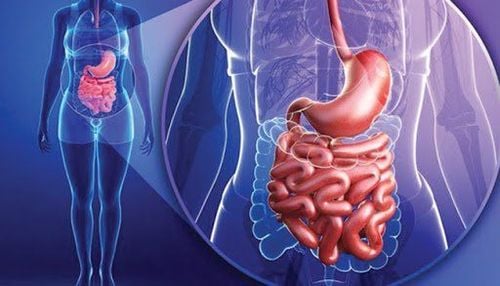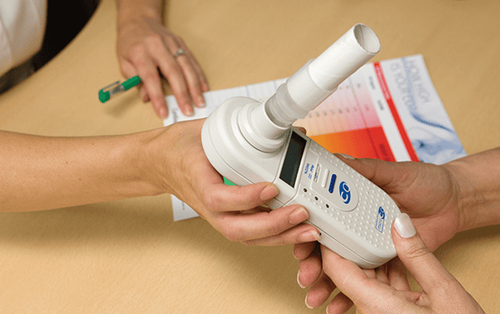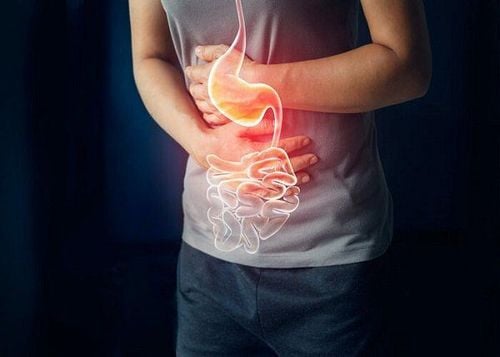This is an automatically translated article.
Your body will absorb nutrients and vitamins when you eat healthy foods. However, the body cannot absorb these nutrients when you have malabsorption syndrome. This condition can cause symptoms such as bloating, especially diarrhea.More importantly, if patients with malabsorption syndromes are not treated promptly and appropriately, they are at increased risk of serious complications, including infection and fractures.
1. What is malabsorption syndrome?
The small intestine's main role is to absorb nutrients from the food you consume into your bloodstream. Malabsorption syndrome refers to a number of disorders in which the small intestine cannot absorb enough certain nutrients and fluids.The nutrients that the small intestine often has difficulty absorbing can be macronutrients (proteins, carbohydrates and fats), micronutrients (vitamins and minerals), or both.
2. Causes of malabsorption syndrome
Normally, your body absorbs most of the nutrients into your bloodstream through the wall of your small intestine as food is digested through the digestive system. The blood then carries nutrients, such as protein or calcium, to bones, muscles, and other organs.Many causes can lead to malabsorption syndrome, from certain diseases to infections or birth defects.
Factors that can cause malabsorption syndrome include:
Damage to the intestines due to infection, inflammation, trauma, or surgery Long-term use of antibiotics Having other conditions such as celiac disease, Crohn's disease , chronic pancreatitis or cystic fibrosis Lactase deficiency or lactose intolerance Having certain birth defects or present after birth, such as biliary atresia, where the bile ducts do not develop normally and block the flow of bile from the liver Disease of the gallbladder, liver, or pancreas Parasites Damage to the lining of the intestines from radiation therapy Some drugs can damage the lining of the intestines, such as tetracycline, colchicine, or cholestyramine. Having surgery to remove part of your small intestine means you have less surface area in the remaining small intestine to absorb nutrients.

Khi thực hiện phẫu thuật cắt bỏ một phần ruột non có nghĩa là bạn có ít diện tích bề mặt hơn ở phần ruột non còn lại để hấp thụ chất dinh dưỡng
Malabsorption syndrome can also be caused by digestive problems. Your stomach may not be able to produce the enzymes needed to digest certain foods. Or your body is unable to mix the food consumed with the enzymes and acids produced by the stomach.
There are also a number of other uncommon causes that can lead to malabsorption syndrome. One of them is called short bowel syndrome (SBS).
In patients with SBS, the small intestine is shortened. This makes the gut's ability to absorb nutrients less efficient. SBS can be a birth defect or it can be caused by surgery.
Several other factors can contribute to malabsorption syndrome, including tropical fungal infections, a condition most common in the Caribbean, India, and other countries in Southeast Asia. This disease can be related to environmental factors, such as toxins in food, infections or parasites.
An even rarer potential cause of malabsorption is Whipple's disease caused by a bacterial infection.
3. Risk factors for malabsorption syndrome
Several factors increase the risk of malabsorption syndrome, including:Family history of cystic fibrosis or malabsorption Heavy alcohol consumption Having had bowel surgery Using certain medications, including laxatives or mineral oil Travel to the Caribbean, India and other parts of Southeast Asia
4. Symptoms of malabsorption syndrome
Malabsorption causes abdominal discomfort, including gas and bloating. Chronic (or ongoing) diarrhea is a very common sign of malabsorption syndrome. You should contact your doctor if you experience any of the above symptoms.Symptoms of malabsorption syndrome are caused when unabsorbed nutrients pass through the digestive tract.
Symptoms vary depending on the specific nutrient or the nutrient is not absorbed properly. Other symptoms are the result of a deficiency of that nutrient, caused by poor absorption.
You may experience the following symptoms if you cannot absorb fats, proteins, or certain sugars or vitamins:
Fats: You may have light-colored, foul-smelling, soft stools. Stools are difficult to flush and can float or stick to the toilet wall. Protein: You may experience dry hair, hair loss, or water retention. Fluid retention is also known as edema and will manifest as swelling. Certain sugars: You may experience bloating, gas, or diarrhea. Certain vitamins: You can develop anemia, malnutrition, low blood pressure, weight loss, or weakness. Scaly skin rash Malabsorption can affect people based on age or gender count. For example, women may stop menstruating and children may not develop normally. A child's weight or rate of weight gain may be significantly lower than that of other children of the same age and sex.
Another sign of malabsorption in children is that they may avoid certain foods.

Nếu bạn kém hấp thu chất đạm bạn có thể bị khô tóc, rụng tóc
5. Complications due to malabsorption syndrome
If your body isn't getting the vitamins, minerals, and other nutrients it needs to function and grow, you can develop serious complications. When this condition is left untreated, malabsorption syndrome can lead to some of the following risks:Higher chance of infection and weight gain Certain nutrients, such as vitamin A and zinc, are essential for a healthy immune system and proper development. If your body doesn't absorb other important vitamins and minerals, your health can suffer.
6. Subjects at high risk of malabsorption syndrome
Children with severe stomach flu may be more likely to develop malabsorption syndrome of a shorter duration.You may not need treatment for a short-term problem. Ongoing malabsorption syndrome is more likely if you have one of the following digestive conditions:
Cystic fibrosis (your body produces thick mucus that interferes with the functioning of the embryo and the digestive system) Celiac disease Crohn's disease (the inflammation caused by this disorder makes it harder for your intestines to absorb nutrients) Several other factors can increase your chances of getting the syndrome:
Are taking laxatives or taking antibiotics for a long time. Intestinal surgery Traveling to places known for intestinal parasites

Nếu bạn đang dùng thuốc nhuận tràng hoặc thuốc kháng sinh lâu ngày, bạn có thể có nguy cơ mắc hội chứng kém hấp thu
7. Diagnosis of malabsorption syndrome
When your doctor suspects you have malabsorption syndrome, you need to let him know of any symptoms you are experiencing, such as chronic diarrhea or nutrient deficiencies or significant weight loss despite eating. Drink in a healthy way and the foods you eat.The doctor may do some tests to find the cause of the problem. These include:
Stool test: Too much fat in your stool could mean you have malabsorption syndrome. This is a reliable test Lactose hydrogen breath test: Your doctor can see how well you are absorbing nutrients by measuring the amount of hydrogen in your breath after you drink a lactose (lactose) solution. . Breath test: This test can be used to check for lactose intolerance. If lactose is not absorbed, it enters the colon. Bacteria in the colon break down the sugar lactose and produce hydrogen gas. The excess hydrogen will be absorbed from your intestines, into your bloodstream, and then into your lungs. You will then exhale air. If you have hydrogen gas in your breath after drinking a product that contains lactose, you may have lactose intolerance. Blood tests: These tests measure the levels of specific nutrients in the blood, such as vitamin B12, vitamin D, folate, iron, calcium, carotene, phosphorus, albumin, and protein. A lack of one of these nutrients does not mean that you have malabsorption syndrome or that you are not choosing foods with the right nutrient content. Normal levels of these nutrients suggest that malabsorption is not a problem. Sweat test: Performing a study on a sweat sample can help diagnose cystic fibrosis. One of the effects of this disease is the lack of enzymes to properly digest food. Small bowel biopsy: a small tissue sample is taken from inside the small intestine and studied to see if it shows signs of infection or other problems. The biopsy will likely be done endoscopically. A tube is inserted into the mouth and passed through the esophagus, stomach, and small intestine to take a small sample of cells. Endoscopy: Your doctor uses a long, flexible tube with a camera attached to it to examine your intestines. Imaging tests: These tests take pictures of your digestive system to look for structural problems. For example, your doctor may order a CT scan to look for thickening of the wall of your small intestine, which could be a sign of Crohn's disease.

Xét nghiệm hơi thở có thể được sử dụng để kiểm tra tình trạng không dung nạp lactose
8. Treatment of malabsorption syndrome
Treatment of malabsorption syndromes depends on the cause.You may be put on a special diet of foods that are easier to digest and absorb. You may also be given supplements to make up for nutrients that are not being absorbed well. Also monitor the patient's condition for signs of dehydration, which may include increased thirst, decreased urine output, dry mouth, and dry skin or tongue.
Sometimes the cause of malabsorption syndrome is an overactive intestinal tract. Medicines may be prescribed to help the body relax and allow more time for nutrients to enter the bloodstream.
If the cause is an infection, your doctor may prescribe an antibiotic.
Your doctor will likely start treatment by addressing symptoms such as diarrhea. Medications such as loperamide may be helpful.
In addition, the doctor will provide care based on the cause of the absorption problem. For example, if you are found to be lactose intolerant, your doctor will likely recommend that you avoid milk and other dairy products or take lactase tablets. In these cases, your doctor may refer you to a dietitian. A dietitian will create a treatment plan to help make sure you're getting the nutrients your body needs. A dietitian may recommend the following:
Enzyme supplements: These supplements can help your body absorb nutrients that it cannot absorb on its own. Vitamin supplements: A dietitian may recommend high doses of vitamins or other nutrients to make up for those not being absorbed by the gut. Dietary changes: A dietitian can adjust the diet to increase or decrease certain foods or nutrients. For example, you may want to avoid high-fat foods to reduce diarrhea and increase potassium-rich foods to help balance electrolytes. Your doctor and dietitian can help create a treatment plan to manage symptoms caused by malabsorption syndrome and allow your body to get the nutrients and fluids it needs. normal operation.

Nếu nguyên nhân hội chứng kém hấp thu là do nhiễm trùng, bác sĩ có thể kê cho bạn đơn thuốc kháng sinh
9. Prevention of intestinal malabsorption syndrome
Malabsorption syndrome is not always preventable, especially if you have celiac disease, cystic fibrosis, or other chronic conditions. A chronic condition is one that is continuous and lasts for a long time, from a few months to a lifetime.However, you should work closely with your doctor to keep these diseases under control as much as possible. You should use laxatives and antibiotics carefully and only when absolutely necessary.
If you are on a special diet rich in the nutrients your body needs, consult your doctor, nurse or dietitian if you have any questions.
Please follow the website ( www.vinmec.com ) for more information on health care instructions, which we will update regularly.
Please dial HOTLINE for more information or register for an appointment HERE. Download MyVinmec app to make appointments faster and to manage your bookings easily.
Reference sources: webmd.com, healthline.com












